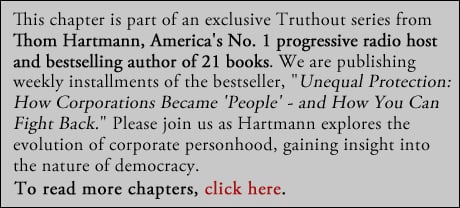Part of the Series
Thom Hartmann | Unequal Protection: How Corporations Became 'People' and How You Can Fight Back
Did you know that Truthout is a nonprofit and independently funded by readers like you? If you value what we do, please support our work with a donation.
Although the increasingly unrestrained marketplace that Teddy Roosevelt and Louis Brandeis warn of makes it hard for many companies to emphasize community values, some still do. Others are recognizing the need to respond to human demands for a cleaner, safer, less toxic world.
Additionally, many people are fortunate enough to work in an industry they love, and the love of railroads or automobiles or flying or medicine has motivated the start-up and the ongoing operation of many of what are now the world’s best companies.
In my experience in business, it’s the people who care about their industry or area of expertise who are the most likely to be successful. And companies with mission statements and standards of behavior that let people ethically live out their passions can be wonderful places to work.
As people take back control of their governments and begin to again regulate how far businesses can go, the vast majority of ethical and appropriately run corporations can begin to operate in ways that are more long-term and more community oriented.
Revoking Corporate Charters Is Not at All New
The process of revoking corporate charters goes back to the very first years of the United States. Beginning in 1784 (four years before the U.S. Constitution was ratified), Pennsylvania demanded that corporations include a revocation clause in corporate charters.2
As the United States grew, laws were passed requiring revocation clauses in the corporate charters (permissions) of insurance companies in 1809 and banks in 1814. From the founding of America to the late 1800s, governments routinely revoked corporate charters, forcing the liquidation and the sale of assets. Banks were shut down for behaving in a “financially unsound” way in Ohio, Mississippi, and Pennsylvania. And when corporations that ran the turnpikes in New York and Massachusetts didn’t keep their roads in repair, those states gave the corporations the death sentence.
In 1825 Pennsylvania passed laws making it even easier for that state to “revoke, alter, or annul” corporate charters “whenever in their opinion [the operation of the corporation] may be injurious to citizens of the community,” and by the 1870s nineteen states had gone through the long and tedious process of amending their state constitutions expressly to give legislators the power to terminate the existence of corporations that originated in those states.
Watch the video that accompanies this chapter, “Buying Local Is Just a Starter”:
Presidents have even run for public office and won on platforms that included the revocation of corporate charters. One of the largest issues of the election of 1832 was Andrew Jackson’s demand that the corporate charter of the Second Bank of the United States not be renewed.
Following his lead states across the nation began examining their banks and other corporations; and in just the year 1832 Pennsylvania pulled the charters of ten corporations, sentencing them to corporate death “for operating contrary to the public interest.”
Oil corporations, match manufacturers, whiskey trusts, and sugar corporations all received the corporate death penalty in the late 1800s in Michigan, Ohio, Nebraska, and New York. And when, in 1894, the Central Labor Union of New York City campaigned for the New York State Supreme Court to revoke the charter of Standard Oil Trust of New York for “a pattern of abuses,” the court agreed and dissolved the company.
It was the beginning of a bandwagon that ended only, for all practical purposes, with the election of President Warren G. Harding in 1921, with his promise to have “less government in business and more business in government.”
Legislative Remedies
Whether the threat is one of economic penalty, regulation, or even dissolution, the fact is that laws do change corporate behavior. For example, literally millions of corporate decisions are made daily around the world in response to tax laws. In Germany, where a government-imposed energy tax causes oil and gasoline to cost more than twice what it does in the United States, industry is roughly twice as energy-efficient as American companies and with significantly lower toxic and atmosphere-destabilizing discharges as a result. When the three-martini lunch became no longer deductible under U.S. tax law, most American companies changed their guidelines for employee behaviors and reimbursements.
Thus, if humans were to again decide that they wanted corporations to behave in a way that protected the living environment that sustains all life forms (including humans), we could indeed pass laws making it unprofitable or dangerous for corporations to do otherwise. Taking it a step further, we could even pass laws that give corporations incentives to actively help the environment.
With the end of corporate personhood, it will be possible for the humans of the United States and every nation in the world to define the terms of a new economy. With natural persons once again in charge of government, we can redefine the rules of business so that corporations are profitable when their actions lead to sustainability and a clean environment, respond to values defined by local communities, and promote and develop renewable forms of energy. We can strip out the strings and the harnesses put into regulatory law by corporate lobbyists so that the government agencies charged with protecting us from malefactors and criminals can once again work.
Eliminating Corporate Personhood
Once corporate personhood is eliminated and corporations are again seen as they really are—the fictitious legal creatures of the states that authorized and created them—all this can change. The rightful representatives of humans— our governments—can then pass laws like the ones that were once part of this nation and its states, forbidding corporations from attempting to influence the laws and the regulatory agencies that oversee their activities.
As stated in the Wisconsin law that stood until it was finally noticed and struck down in 1953, No corporation doing business in this state shall pay or contribute, or offer, consent or agree to pay or contribute, directly or indirectly, any money, property, free service of its officers or employees or thing of value to any political party, organization, committee or individual for any political purpose whatsoever, or for the purpose of influencing legislation of any kind, or to promote or defeat the candidacy of any person for nomination, appointment or election to any political office.3
Returning Political Power to the People
When decisions are made locally, their full range of impacts, including all present and future costs, are more likely to be considered. If a community knows that extracting a mineral from its soil will produce environmental damage, it can require the mining corporation to pay for that damage in advance or as product is extracted—without worrying that, because some other community has chosen not to so tax the corporation, the community is trampling the “rights” of the corporation under the Fourteenth Amendment’s equal protection clause.
German historian and author Wolfgang Sachs noted in an interview with former California governor Jerry Brown, “Nature has only been minimally present in the market. The market thrives on the fact that nature doesn’t cost anything.”4 Except it does cost something to the local communities, who must suffer with the effects of strip mining, toxic waste, loss of topsoil, and the destruction of their ecosystems.
When corporations are changed from natural-person to artificial-person status, the natural persons who live in these regions can begin to legislatively regulate the actions of any corporation that seeks to exploit their nature.
Once again in America, as Thomas Jefferson hoped would always be the case, “the people, being the only safe depository of power, should exercise in person every function which their qualifications enable them to exercise, consistently with the order and security of society.”5
Democracy in the Global Marketplace
On January 20, 1949, President Harry S. Truman in his inaugural address committed the United States to helping lift much of the world out of poverty.6 It was the first time a national leader had used the word “development” to describe a national goal outside the United States, or “undeveloped” to describe what we now call the third world or the developing world. Truman was quite clear and specific about his vision:
We must embark on a bold new program for making the benefits of our scientific advances and industrial progress available for the improvement and growth of underdeveloped areas. More than half the people of the world are living in conditions approaching misery. Their food is inadequate. They are victims of disease. Their economic life is primitive and stagnant. Their poverty is a handicap and a threat both to them and to more prosperous areas.
Pointing out that the United States had the resources and the knowledge to help lift people around the world out of poverty and misery, Truman demanded that corporations that had an eye to exploiting the developing world be restrained. He said, “The old imperialism—exploitation for foreign profit—has no place in our plans.”
Instead, he added, the poorer people of the world must have the ability to determine their own fates and control for themselves the extent of our companies’ participation in their nations as well as the extent of their own development. “Democracy alone can supply the vitalizing force to stir the peoples of the world into triumphant action,” Truman said, “not only against their human oppressors, but also against their ancient enemies—hunger, misery, and despair.”
The role of government is to protect, defend, and represent the interests of its own people, he said. “Democracy maintains that government is established for the benefit of the individual, and is charged with the responsibility of protecting the rights of the individual and his freedom in the exercise of his abilities.” Citing Locke’s concept of natural rights, he added, “Democracy is based on the conviction that man has the moral and intellectual capacity, as well as the inalienable right, to govern himself with reason and justice.”
Truman’s vision was a challenge to corporate personhood, but NAFTA, GATT, WTO, and fast-track authority have sidetracked it. Ending corporate personhood would allow communities to correct this situation and empower them to enforce ethical and socially responsible corporate behavior.
Notes:
1. U.S. Supreme Court Justice Brandeis in his dissenting opinion on the 1933 Liggett v. Lee case that—based on the Santa Clara headnote—gave chain stores equal tax rights under the Fourteenth Amendment to “compete” against small, locally owned retailers, and led in part to the loss by local communities of their abilities and rights to regulate chain stores and to have a say in the size of businesses operating in their communities.
2. The information in this section comes from Paul Hawken, The Ecology of Commerce (New York: HarperCollins, 1994).
352 Unequal Protection
3. Wisconsin law, Section 4489a (Sec. 1, ch. 492, 1905).
4. Jerry Brown, Dialogues (Albany, CA: Berkeley Hills Books, 1998).
5. Thomas Jefferson to Dr. Walter Jones, January 2, 1814, https://www.let.rug.nl/usa/P/tj3/ writings/brf/jefl226.htm.
6. Harry S. Truman, inaugural address, January 20, 1949, https://www.bartleby.com/124/ pres53.html.
This material is not covered under Creative Commons license and cannot be published without the permission of the author and Berrett-Koehler Publishers.
Copyright Thom Hartmann and Mythical Research, Inc.
Press freedom is under attack
As Trump cracks down on political speech, independent media is increasingly necessary.
Truthout produces reporting you won’t see in the mainstream: journalism from the frontlines of global conflict, interviews with grassroots movement leaders, high-quality legal analysis and more.
Our work is possible thanks to reader support. Help Truthout catalyze change and social justice — make a tax-deductible monthly or one-time donation today.

